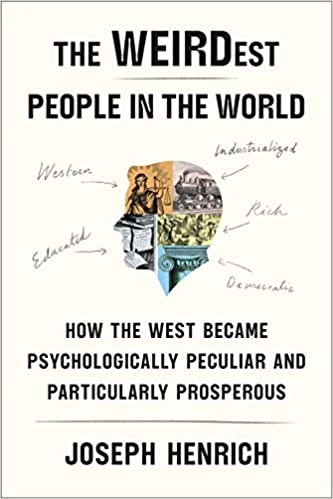Reading Level
What is the reading level of The WEIRDest People in the World: How the West Became Psychologically Peculiar and Particularly Prosperous?
Analysing the books in the series, we estimate that the reading level of The WEIRDest People in the World: How the West Became Psychologically Peculiar and Particularly Prosperous is 13th and 14th grade.
Expert Readability Tests for
The WEIRDest People in the World: How the West Became Psychologically Peculiar and Particularly Prosperous
| Readability Test | Reading Level |
|---|---|
| Flesch Kincaid Scale | Grade 13 |
| SMOG Index | Grade 14 |
| Coleman Liau Index | Grade 13 |
| Dale Chall Readability Score | Grade 7 |
Reading Time
11 hrs 49 mins
How long to read The WEIRDest People in the World: How the West Became Psychologically Peculiar and Particularly Prosperous?
The estimated word count of The WEIRDest People in the World: How the West Became Psychologically Peculiar and Particularly Prosperous is 177,165 words.
A person reading at the average speed of 250 words/min, will finish the book in 11 hrs 49 mins. At a slower speed of 150 words/min, they will finish it in 19 hrs 42 mins. At a faster speed of 450 words/min, they will finish it in 6 hrs 34 mins.
| The WEIRDest People in the World: How the West Became Psychologically Peculiar and Particularly Prosperous - 177,165 words | ||
|---|---|---|
| Reading Speed | Time to Read | |
| Slow | 150 words/min | 19 hrs 42 mins |
| Average | 250 words/min | 11 hrs 49 mins |
| Fast | 450 words/min | 6 hrs 34 mins |
- Authors
-
Joseph Henrich
More about The WEIRDest People in the World: How the West Became Psychologically Peculiar and Particularly Prosperous
177,165 words
Word Count
for The WEIRDest People in the World: How the West Became Psychologically Peculiar and Particularly Prosperous
704 pages
Pages
19 hours and 3 minutes
Audiobook length
Description
A New York Times Notable Book of 2020A bold, epic account of how the co-evolution of psychology and culture created the peculiar Western mind that has profoundly shaped the modern world.Perhaps you are WEIRD: raised in a society that is Western, Educated, Industrialized, Rich, and Democratic. If so, you’re rather psychologically peculiar.Unlike much of the world today, and most people who have ever lived, WEIRD people are highly individualistic, self-obsessed, control-oriented, nonconformist, and analytical. They focus on themselves―their attributes, accomplishments, and aspirations―over their relationships and social roles. How did WEIRD populations become so psychologically distinct? What role did these psychological differences play in the industrial revolution and the global expansion of Europe during the last few centuries?In The WEIRDest People in the World, Joseph Henrich draws on cutting-edge research in anthropology, psychology, economics, and evolutionary biology to explore these questions and more. He illuminates the origins and evolution of family structures, marriage, and religion, and the profound impact these cultural transformations had on human psychology. Mapping these shifts through ancient history and late antiquity, Henrich reveals that the most fundamental institutions of kinship and marriage changed dramatically under pressure from the Roman Catholic Church. It was these changes that gave rise to the WEIRD psychology that would coevolve with impersonal markets, occupational specialization, and free competition―laying the foundation for the modern world.Provocative and engaging in both its broad scope and its surprising details, The WEIRDest People in the World explores how culture, institutions, and psychology shape one another, and explains what this means for both our most personal sense of who we are as individuals and also the large-scale social, political, and economic forces that drive human history. Includes black-and-white illustrations.
